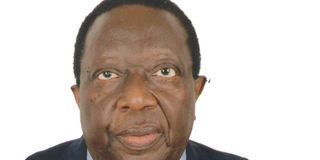With presidential term limits, age limit would be irrelevant

William G Naggaga
In 2005 , members of Uganda’s Parliament committed a ‘cardinal sin’ when they accepted to be bribed to eliminate the two-term limit for one to be president as stipulated in the 1995 Constitution.
It was an unprecedented treachery by the so-called representatives of the people by removing the ‘safety valve’ which was supposed to banish the scourge of leaders who have a tendency to rule for life.
What was most disturbing is that the two-term limit was not even allowed to be tested. The election of 2006 was supposed to usher in a new chapter in the political history of Uganda, the peaceful handover of power from one president to the next. Most of us were looking forward to be part of that day.
When the provision for a two-term limit was inserted in the 1995 Constitution, members of the Constituent Assembly believed it would create stability and re-assure the population that there will be ‘an open door’ at State House and every 10 years or earlier, a new face would steer the affairs of the country.
I recall what president Clinton and president Obama [both former US presidents] said in almost identical statements, when they were leaving the White House in 2001 and 2016 respectively after serving two terms of office each. “I have been a popular president and loved the job and I believe strongly that if I run again, I would win but I won’t because that is the law” or words to that effect. Both were among the most popular presidents in US history
The reasons advanced for lifting term limits in 1995, which led Parliament to oblige, were not convincing. There is a saying in Luganda, which goes “n’azina obulungi ava mu ddiiro” - loosely translated that even the best dancer eventually has to leave the floor or stage.
In any country, there is a pool of capable people ready to step forward into leadership; given the right circumstances or conditions. To create the impression that without so and so the country is doomed, is ridiculous.
When Harry Truman, then US vice president became president of the US after the death of Franklin Delano Roosevelt in 1945, Eleanor Roosevelt, wife of FDR said to him: “I am sorry for you Harry, this is a big responsibility”.
Truman went on to win World War II. In 1981 when Yoweri Museveni went to the bush, nobody gave him a chance in hell of coming out alive. He did and became president of Uganda in 1986 and he is still at the job today.
Sam Nujoma, the founding member of Namibia’s SWAPO, which led the country to independence in 1990, served as president of Namibia from 1990 to 2005. He was supposed to leave in 2000 after serving the two terms stipulated in the constitution but rather than changing the constitution to enable him continue in office, a special provision was created giving him ‘bonus’ third term because of “the great historical role he played in the liberation struggle.”
He is enjoying his retirement and constitutional two-term limit still prevails. Namibia’s current president Hage Gottfried Giengob took office in 2015 and is the third so far.
I have had the pleasure of knowing him from the early 1970s at the United Nations when he worked with SWAPO and later at United Nations Secretariat.
The Namibian approach would have been the best way to deal with the situation in Uganda in 2005, if the country felt that an exceptional extension to the tenure of the President was necessary, without tampering with the Constitution and lifting the presidential term limits. I am informed that this approach was considered by some NRM moderates, but it was rejected by the party hardliners.
If only parliamentarians had been wiser in the past, the current debate on lifting the presidential age limits would be totally unnecessary.
I believe the President should listen to voices like those of Mr John Nagenda and prepare the country for a ‘post-Museveni’ era by declaring that he is not interested in serving beyond his current term, which ends in 2021.
I do believe also that we should return to the two-term limits and genuine devolution of power. President Museveni can use the remaining four years of his current term to set the country in a new direction, which will ensure that his past struggle was not in vain.
Mr Naggaga is an economist, administrator and retired ambassador. [email protected]




